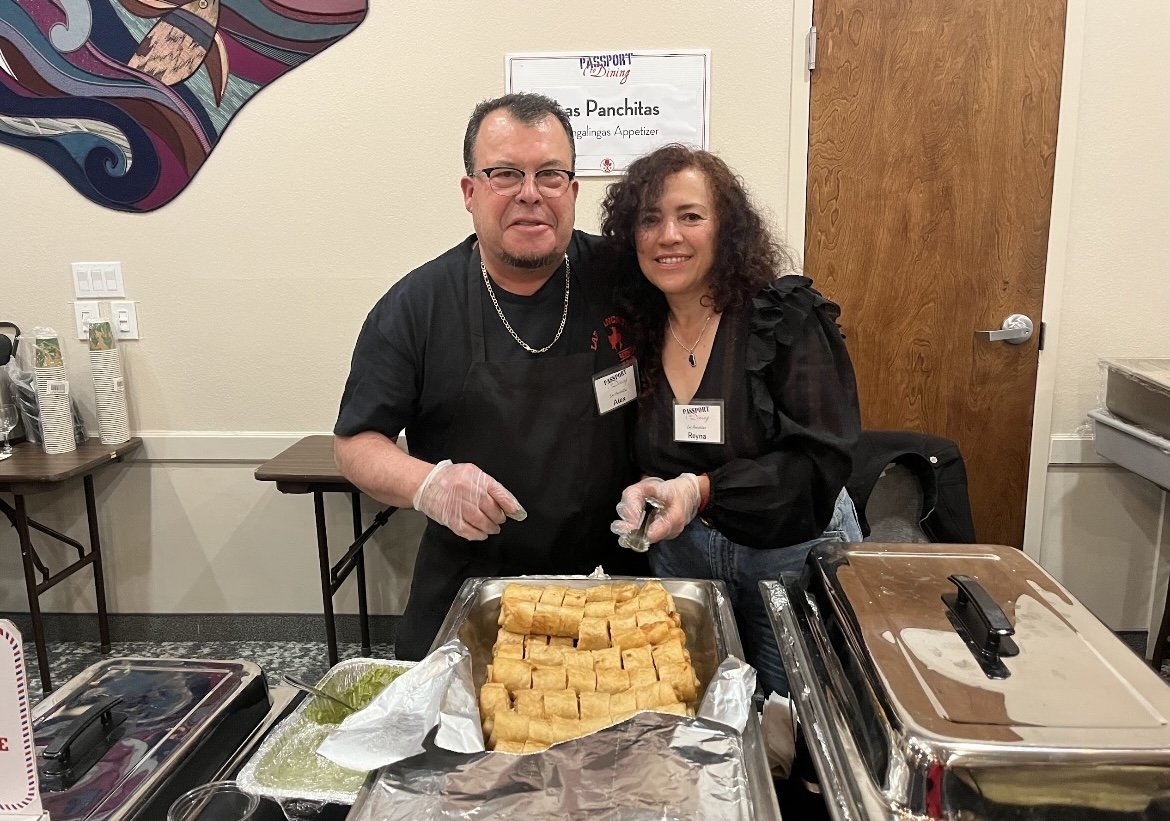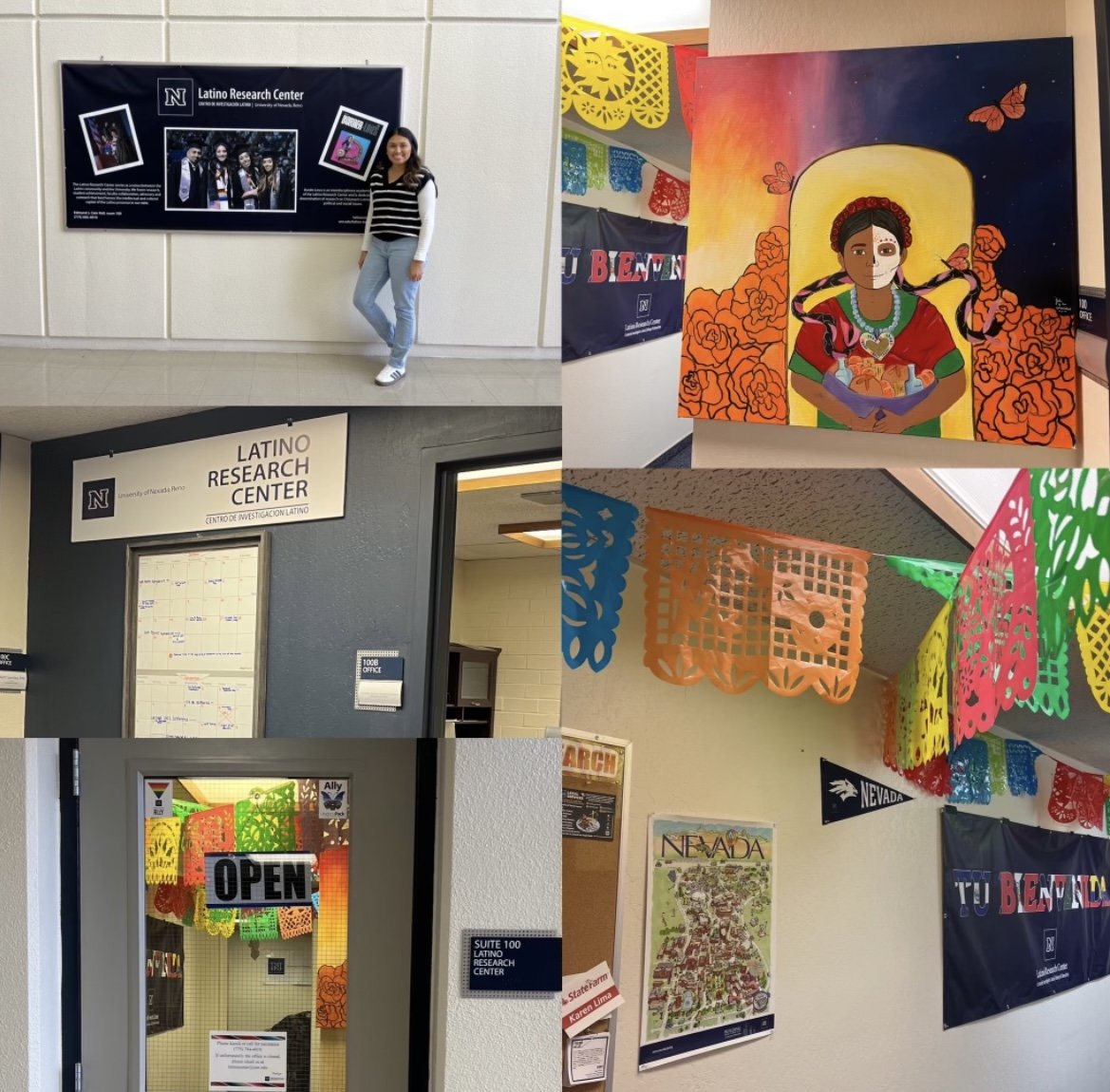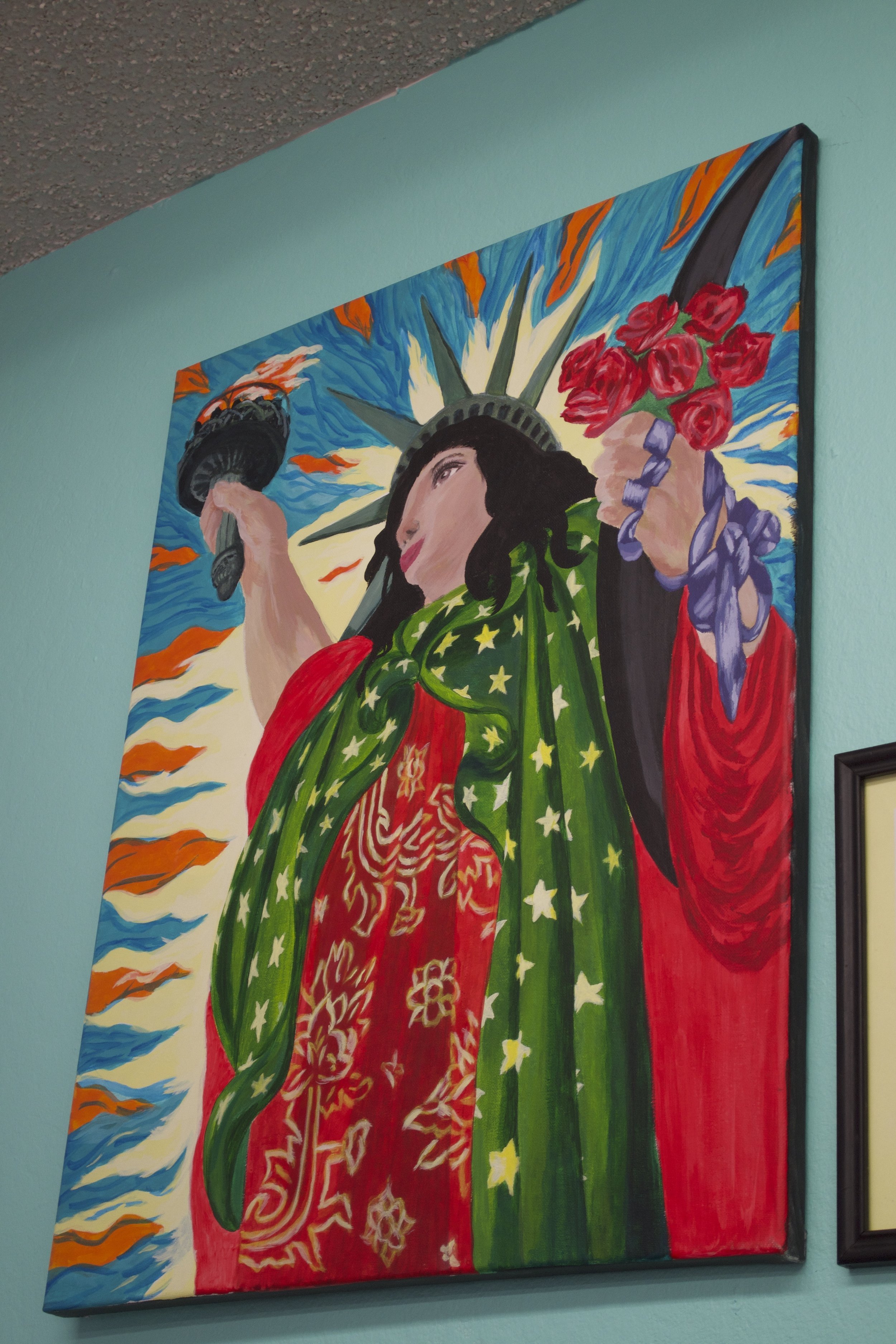Alex Brambila the owner of Las Panchitas, displayed food items from his restaurant at a recent community event in Kings Beach.
As Madison Wanco and Autumn Novotny report, the Reno-Tahoe area is home to a large demographic with a Mexican background. While dealing with the difficulties of settling in a new country, these strong communities are resilient through their value system and family ties.
In the vast region between Tahoe and Reno, from day laborers to established entrepreneurs, from DACA to scholarships, from dealing with micro aggressions to wide ranging discrimination, the Mexican American community faces many challenges. By listening to the voices of some of them from Kings Beach, Washoe County, and the UNR campus, we have identified some of the challenges currently being faced: housing instability, harmful stereotyping, and misrepresentation. Through ups and downs, the local Mexican-American community is a strong force of support for one another.
Alberto Garcia, a first generation student at UNR, pursuing a career in school counseling and critical mental health, advocates for undocumented students at UNR, saying they feel they don’t have equal opportunities to thrive.
Garcia’s parents are from Mexico City and moved to Reno in 1989, for its quiet atmosphere and connection to nature. They started working jobs in hospitality when they first came to Reno, and today his father works for a landscaping company and his mother is a housekeeper.
He sees many Mexican American and other Latino students also struggling with housing costs and stereotypes such as, “they don’t belong here,” or being labeled “illegal” or described as “stealing jobs.”
In Kings Beach, the Latino community makes up 45.8% of the entire population and the school system has 50% enrolled Latino students.
In the late 1970s and early 1980s there was a migration of people from Mexico, specifically coming from one state in particular, Guanajuato. At this time the area was underdeveloped and affordable.
There was a huge need and call for services in the North Shore of Lake Tahoe. Kings Beach needed people to help take care of lawns, resorts, and more construction workers.
Emilio Vaca, the past Vice Mayor of Kings Beach who has worked on housing sustainability projects and is a former director of a family research center, believes in pushing home ownership for local Mexican Americans and other Latinos.
“It generates a long term stability model for the social fabric of Kings Beach for the Latinos there,” Vaca said.
Kings Beach was originally built to be a summer housing community. The facilities people called affordable were old shacks or cabins having one room with no kitchen, lacking the basic necessity to make a meal.
Families were often approached by Child Protective Services who would take their children away because these families lived in a place that did not provide warm food for their children, which was considered neglect.
Vaca’s mantra became that having adequate housing is necessary because even though a family could afford a little cabin, it has to be adequate enough to have their children there.
The growth of adequate housing has produced landlords who have a standard to meet for facility accessibility. This situation has also helped Latinos become more vocal in the Kings Beach community.
The vibrant Mexican food restaurants on the Kings Beach strip have also contributed to the housing project and heightened buying power. Establishments such as Tacos Jaliscos, La Mexicana, and Las Panchitas have unique stories behind them of the owners coming to America to start their businesses.
Alex Brambila, the owner of Las Panchitas, came to the United States in the winter of 1982 when he visited his brother in Los Angeles. Alex was on a three-month sick leave from work in Mexico because he had hurt his hand. Some of his brother’s friends, also visiting from the same hometown as Alex in Mexico, told him about a new restaurant which would be called Las Panchitas. They asked Alex to come with them to Lake Tahoe and open up this restaurant. None of them knew anything about Lake Tahoe, but decided to get in a small, janky car and drive there anyway. 1982 was the snowiest winter recorded at this point in time and they were all surprised to see it, they’d never seen snow before. Arriving, they started to clean, put tables and chairs into place, and cooked. When they opened, Alex was the busboy and dish washer. He ended up staying for the entire year, losing his visa in the meantime and couldn’t go back to Mexico. In 1984, he filled out some forms and three months later a red card arrived in the mail; a work permit. A few months passed and a green card was delivered to him, it was one of the best things, he said. He felt that all his hard work was paying off. Working at minimum wage for years as the dish washer and busboy, he started to learn some English and was promoted to waiter, which he had a passion for. The owner eventually made him a cosigner on the business account, taking on the responsibility of doing payroll. People would often ask him if he was the owner because he was always there, always working, and he would reply, “No, I just work here.” He always did feel like he owned the business, and in 2008 he bought Las Panchitas.
Vaca says, “these stories are so redemptive and it’s a Latino journey of reaching the American Dream.”
When Vaca was a young boy, he asked his father what the American Dream meant to him. Vaca thought he would answer with images of a big house and a white picket fence, but to his surprise, his father said, “you are my American Dream.” With these few words that hold so much meaning, Vaca realized what the American Dream meant to someone who migrated to this area.
The goal for many immigrants is to put children in a better place and in a healthier, safer environment than in their own hometowns. It is not the big house, the nice cars, or the prestigious job, it is putting their children in a position to have success and happiness.
The Latino community in Kings Beach acts fast when one of them is in need, everyone will step up, Vaca says.
They will often organize a fundraiser called Kermes, where tickets are sold to buy food, drinks and other items. Jumpy houses are usually blown up and live music is performed. The money collected will go to the one family in need to pay their bills or used for other needs.
All of the vendors will donate the food, the time, and the labor for this one family.
“If the community doesn’t mirror itself, then we have a problem, and that means we are moving away from what makes us a community,” Vaca said. “Right now, Kings Beach still has that reflection in the mirror and it can see itself in that reflection. The American dream is not dead to them.”
Churros Huesos has a home base in Sun Valley where their food truck can be found at Mendoza’s Coffee shop, but they cater to all of Reno including at the University of Nevada, Reno. Churros Huesos is a family business that started more than 20 years ago. It carries the last name Huesos which also belongs to Jose and Agustin’s father. “I learned how to make churros helping my dad in Mexico when I was 15 or 16 years old,” says Jose.
“[My father] was the one who initiated this in Mexico making churros for many years at the fairs,” Agustin remembers. The style and flavors come from the Jalisco area, and now their truck thrives in northern Nevada. Its one of the many Mexican-American success stories we have highlighted on Our Town Reno.
The Reno-Tahoe area has many successful Mexican-Americans and other Latinos within the community, but this population is no stranger to facing negative stereotypes despite making up a large portion of local demographics.
Patricia Guerrero, the Latino Research Center Coordinator at the University of Nevada, Reno, conducts an activity during NevadaFit that helps Latino students openly discuss stereotypes. She has students write one positive stereotype on green colored cards and one negative stereotype on red colored cards.
Common answers written on the red cards were that they are taking people’s jobs, they are illegal, and feeling like they don’t belong. Students often come to her with concerns of feeling voiceless and unable to be their authentic selves in the classrooms.
Guerrero finds that these students feel comfortable when they are surrounded by people that look similar to them where they can be heard. Another issue she identifies is students feeling like they don’t know how they are going to survive due to food and financial insecurity.
A painting depicting a version of the American Dream at Tu Casa Latina, a local nonprofit catering to Latino populations.
Osvaldo Jimenez-Estupinan, Director of Latinx/Hispanic Community Relations at UNR, explains how Latino families can weigh into their children’s education.
He is a first generation graduate from UNR and he recalls his own experience where he thought of dropping out of college his sophomore year due to his family needing him.
His parents came to America when they were teenagers, with less than a sixth grade education. He grew up in a trailer park in South Lake Tahoe and his family moved to Reno when he was four years old where they purchased a three bedroom house for 12 people to live in.
Remembering the constant Kermes parties going on in the trailer park he says, “there was a lot of community there which I think is the beautiful thing about Hispanic culture. It's a lot about the community and ‘we’. It is not so much about ‘I’ or ‘me’.”
There are resources on the UNR campus for Latino students to receive help, advice, or even just spend time. The Latino Research Center, utilizes the research they conduct to better understand the students they do outreach for and figure out how to help. This research helps them figure out what their greatest obstacles and barriers may be and how to offer or point them in the right direction.
These community values are also reflected in family values which is why he often had to miss class to take his grandma to the doctor or help with his family’s cleaning business.
When he rejected a job offer right out of high school to instead attend college, his parents were surprised, “coming from this Hispanic culture I see the misconceptions from a lot of families about education or about what you come to school for,” Jimenez said.
Due to this disconnect, Jimenez grew up thinking college was only for doctors or engineers. He did not know about art, journalism or other possible studies. He wonders how many more students are like him who don’t know they can go to college for.
Jimenez visited the UNR campus his senior year of high school because of the first generation program the university provides. If it wasn’t for this program, he says he would have never attended college here.
Jimenez wants to work on spreading the word to students at nearby middle school and high schools to show them that UNR has all sorts of degrees and programs for them. He also advocates for the university to reach a population of 25% Latino and Hispanic students to qualify as a Hispanic-Serving Institution (HSI).
HSI has been around since 2013 and UNR is currently the only college in Nevada that does not qualify. Qualifying for this program would allow the university to receive more federal grants for Latino and first generation students.
The Latino Research Center is best known for the events they host on campus, such as the Dia de Los Muertos event held in fall semesters.
Jimenez identifies another issue at UNR where some professors don't understand how a student may need to help support their siblings, work, help their parents pay their bills, or help run their family's business.
A solution to this, he says, could be for the university to hire more Latino professors and instructors, so “students feel comfortable with someone who represents the same background or even just has an understanding of where they come from.”
The currently enrolled first generation graduate student at the University of Nevada, Reno, Garcia, saves money by qualifying for in-state tuition, living with his parents in a low income neighborhood, and working two jobs.
The main problems Garcia highlights are the student housing crisis and academic difficulties for undocumented students. There has been a lot of build up and construction for luxury student living apartments around campus, making it more and more difficult for non-affluent students to afford campus housing.
Working with a lot of undocumented students, Garcia sees the struggles they face to have a normal college experience and be a part of the UNR community. The UNR undocumented students fear deportation, are scared to go to the hospital, can’t attend field trips or study abroad. Garcia has observed a lot of undocumented students dropping out because they have to work to afford groceries and rent.
One of the reporters for this project Madison Wanco has her own family history related to this topic. Her mom of Mexican origin, Angeles Wanco, went to college at UNR in the 90s where she earned a degree in communications, despite being the first to graduate from college in her family and coming to the United States when she was very young.
She came to Chicago first when she was just six years old and only was able to stay for a short period of time, but learned English during that part of her life.
When she went back to Mexico, she completely lost everything she learned about the English language and had to relearn it when she moved back to Chicago when she was fourteen. Many children have a hard time in school, grasping certain concepts and abilities, because no one is perfect at all subjects and the learning curve on certain lessons can be tough.
At that point, they never moved back to Mexico. Her family moved to Los Angeles where she graduated high school and started community college.
They all moved to Reno after that, where Wanco transferred colleges and her younger sisters graduated high school. Despite moving so much in her youth, she has been living in Reno for several decades now.
Wanco is currently a real estate agent here in Reno, Nevada. Her personal story goes to show that the road is bumpy most of the time when moving from one country to another, because of the language barrier and culture shock, but many people like her have been able to rise above struggles and build families, pursue their passions and worthwhile careers.
In the face of adversity, the Mexican-American and Latino communities stand strong as a united front to help one another and improve the quality of their lives one step at a time. Dealing with a housing and financial crisis, negative stereotyping, and misrepresentation is deeply impacting this community. The actions that could potentially improve these difficult situations is adequate housing, homeownership, inclusivity practices, positive stereotyping, and bringing more attention to the programs and services available to help these first and second generations reach their own version of the American Dream, here in the beautiful Tahoe/Reno region.








